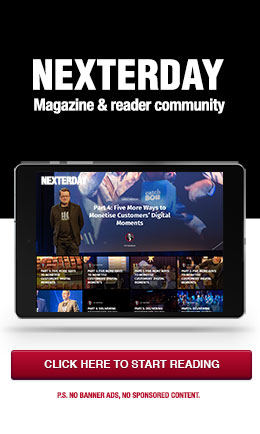Posted: May 25th, 2012 | Author: Steve Hateley | Filed under: Events | Tags: billing, business, charging, CIQ4T, contextual intelligence, customer, innovation, Management World 2012, TM Forum, TNO Information & Communication Technology | 2 Comments »
While the weather remained unexpectedly warm here in Dublin, the conversations at Management World 2012 also heated up this week. Like Keith Willetts discussed in his keynote session, dealing with competition from over-the-top (OTT) players, combating churn and managing revenue growth were big areas of focus at TM Forum’s annual flagship conference. I had the pleasure of sitting in on a session that touched upon these industry challenges and really reinforced the overall theme of innovation.
Henk Ensing, technical consultant for TNO Information & Communication Technology, a Dutch institute for applied science that specialises in helping companies innovate, covered the potential for dynamic billing and why communications service providers (CSPs) need to inject some new thinking into their charging concepts and business processes. He highlighted that the key elements to dynamicity were analysing transaction-based usage, applying intelligent business rules and considering the contextual status of individual customers. Coincidentally, these were the main attributes for Comptel’s own Contextual Intelligence for Telco (CIQ4T) perspective.
Henk went on to state that dynamic billing brings the element of customer trust to a new level and illustrated this with an analogy comparing CSPs to fresh produce market merchants. Many people have a regular routine of going to the market on the weekend, generally stopping by their favorite vendors for particular foods. The vendors, in turn, are familiarised with their customers’ preferences and can tailor the products they sell accordingly or make recommendations on complimentary additional products based on their extensive experience with the produce—further strengthening their interactions. The vendors, however, don’t always have fixed prices on their produce, which may vary depending on factors like the season and supply. Yet, what keeps the customers coming back? It’s the relationships the vendors are building and nurturing.
Similarly, dynamic billing is based on strong customer relationships where each transaction is a unique opportunity to create a positive end-user experience. Taking into account the context of and appropriately targeting each individual customer interaction is key though. For example, CSPs should consider where the customer is in his or her lifecycle and what products will fit his or her specific needs and wants, at an appropriate time that adds true value.
Policies that govern charging and the network have an important role to play in understanding and implementing this dynamic ability. According to Henk, the beauty of dynamicity is that these policies can be changed in real time based on customers’ evolving requirements. Say, if someone gets paid every two weeks, he or she can opt to make a payment during that time and customise it depending on his or her personal preferences.
Henk’s thoughts on dynamic billing and charging concepts fit in nicely with the discussions at Management World 2012 and reflected Comptel’s own thinking on how CSP innovation needs to evolve. Analysing customer behaviour is just one step of the process, but intelligently determining their contexts to make interactions more relevant and personalised will significantly result in a high quality of experience and improve CSPs’ bottom lines. Ultimately, it’s about strengthening loyalty through a focus on relationship enhancement.
Posted: March 30th, 2012 | Author: Special Contributor | Filed under: Behind the Scenes, Telecom Trends | Tags: Bulgaria, Comptel, customer, Europe West, Germany, Italy, Netherlands, services, software providers, U.K. | 1 Comment »
Ralph Booth joined Comptel’s Europe West services team as a contract project manager towards the end of last summer and enjoyed it so much he became a permanent employee by the end of the year. In this blog post, Ralph explains why he was impressed by Comptel’s services proposition and strategy.
Since joining Comptel in August 2011, I have found the company’s approach to services particularly refreshing and relevant in today’s market. More often than not for market-leading software providers, the description of services in customer proposals comes loaded with delivery facts, boastful methodology claims and complex resourcing suggestions. In the current market, customers look beyond these brochure-style claims and instead look for a partner to help them evolve, develop and lead. Whilst Comptel is founded on a heritage of successful deliveries, I have found we also have a more relevant services offering that expands our services footprint beyond the traditional delivery credibility into a more engaging and personal service approach. This is what makes frontline services such an exciting and important part of Comptel’s evolving business—we really are all about the customer.
Regional Emphasis: Comptel adopts a regional approach to services, positioning teams in local hubs to bring customers closer to design and implementation work. In Europe West alone, we have regional offices in the U.K., Netherlands, Germany, Bulgaria and Italy. A regional approach guarantees that Comptel builds lasting relationships with our clients.
Relationships and Continuity: During my induction programme, I learned that the average number of years of service by Comptel employees was around five. This emphasis on continuity is crucial in providing a common approach and retaining knowledge about our customers, their preferences and solutions. The experience within the business of our customers allows us to start conversations from a position of mutual understanding.
Relevance and Structure: Services in Comptel are logically structured and include the skills and expertise one would expect, ranging from solution architects, software developers, support teams, project management and ongoing customer care and contact through client management. These defined roles allow us to build sensibly sized project teams with clearly defined roles and objectives that customers understand and can relate to. Furthermore, project team members are accessible and easily contacted or brought on site. Comptel’s customers get to know the personalities who work with them on their deployments!
Interaction and Management Accessibility: Comptel values regular internal and external steering boards. These are held to share, assess and track progress of projects. Significantly, the emphasis placed on these sessions means they are well supported, with senior management attending to listen to the feedback. Feedback is also encouraged through customer satisfaction surveys that look to understand what went well and on occasions what can be improved next time.
Project Management: Comptel recognises the benefit of good, old-fashioned project management and insists on having a dedicated project manager on all of our major programmes. This approach provides our customers with leadership and direction, but also makes a very clear statement as to the level of accountability the services team feels about its work.
To sum up, my impressions thus far are that services from Comptel more than meet our customers’ expectations. Comptel is large enough to deliver, lead and influence, but is small enough to listen to, engage with and build lasting relationships with its customers.





